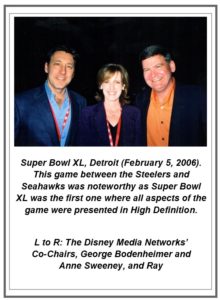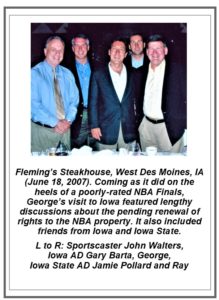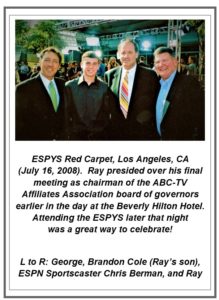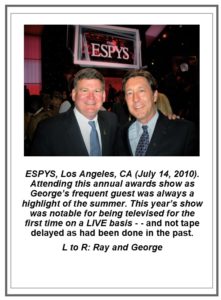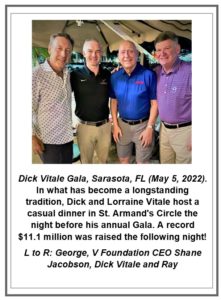“George just genuinely cared about everybody who worked with him and for him. People often talk about ESPN’s culture and how strong it is, but he’s the guy who built it and embodied it. It is a culture of ‘we’re all in this together’ and ideas can come from anywhere, and everybody in the organization is valued. That makes ESPN a remarkable place to work — and that’s what made George Bodenheimer an extraordinary leader and a very special person.”
~Connor Schell, former ESPN executive vice president for content, in “Hangin’ with Winners”
George Bodenheimer was a longtime ESPN executive and cable industry pioneer. As its longest-tenured President, he led ESPN through an unprecedented period of growth and innovation. George started at ESPN in 1981 as a mailroom clerk where one of his early jobs was to pick up college basketball analyst Dick Vitale (see his WINNER profile) at the Hartford airport and drive him to ESPN’s studios in Bristol, CT. But George would rise through the ranks in a manner that was as impressive as it was rapid, and in 1998 George was named President. He retired as Executive Chairman on May 31, 2014 after having played a major role in making ESPN an almost-daily presence in the lives of sports fans. At all times, his focal point was the company’s strategic mission: “Serving Sports Fans. Anytime. Anywhere.”
George and I met shortly after he added the job of President, ABC Sports to his ESPN duties in 2003. We became regular business acquaintances after he was named Co-Chairman of the Disney Media Networks in 2004, and I was elected to the Board of Governors of the ABC Television Affiliates Association in 2004 and later elected as its Chairman in 2006. Over the next 10 years, we would talk often and collaborate regularly on matters that were important to ABC-TV and ESPN; both were majority owned by The Walt Disney Company. Even on those occasions when positions were at odds or our respective interests might be in conflict, the dialogue remained cordial and constructive. That became especially important when Disney opted to consolidate the corporate structure of ESPN and ABC Sports, followed by moves to migrate properties with a long history on ABC to ESPN.
Here are some of the notable challenges and opportunities that ESPN and its ABC affiliates had to navigate our way through during George’s tenure:
Monday Night Football (2005) – For countless sports fans, this sports franchise was an American institution. While it had been a staple on the ABC primetime schedule since its launch in 1970, the ratings had been trending downward. Even more troubling was the fact that even though affiliates were contributing upwards of $35 million annually to the network, the property was losing approximately $150 million a year on the eight-year rights deal set to expire after the 2005 season. Without the dual revenue stream of advertising and subscriber fees afforded to cable networks, affiliates were in no position to increase their contribution. As a result, Monday Night Football moved to ESPN with the start of the 2006 season. This seminal event was a foreshadowing of how sports programming would move from over-the-air broadcast to pay tv platforms in the years to follow. The final Super Bowl to be presented on ABC was Super Bowl XL played at Ford Field in Detroit, MI on February 5, 2006. The broadcast was also noteworthy for being the first Super Bowl where all aspects of the game were produced in High Definition. The NFL has since returned to ABC on a limited basis in the form of games simulcast alongside ESPN and/or presented on a standalone basis.
Saturday Night Football (2006) – “It’s a huge day for ESPN,” said George Bodenheimer when making the announcement that Monday Night Football was moving to the all-sports cable network. He added, “From the Disney perspective, it was a smart move for ABC by moving out of football and having ESPN move into Monday nights.” Smart or not, I encouraged George to be mindful of how the loss of such a landmark program on the ABC schedule would impact the psyche of the broadcast network’s affiliate body. These concerns jump-started discussions about a new marquee franchise: primetime college football. George and his team in Bristol “ran the traps” at warp speed to enable a seamless transition from NFL Mondays to College Football Saturdays. This effort led to the premiere of Saturday Night Football on September 2, 2006 featuring a game between Notre Dame and Georgia Tech. George called the following week to inform me that what we had created was, in fact, the first collegiate sports franchise to appear regularly on a major broadcast network’s primetime schedule. John Wildhack, EVP of Programming for ESPN at the time, would tell me years later how this development was critical to ESPN’s overall college football strategy. “We had long ago identified college football as a growth property. My team and I moved away from the old days of 4-way regional telecasts on ABC. Instead, we viewed college football as a national sport. Creating the Saturday Night Football franchise was essential to keeping ESPN/ABC as the leader in regular season college football, and it was quickly embraced by the major conferences,” Wildhack said. A key to the national strategy was the implementation of “reverse mirrors” which permitted regional games on ABC to be presented in a conference’s home markets while ESPN, ESPN2, or ESPNU would show the game in other outer-markets. With the creation of the Saturday Night Football franchise, ABC affiliates scored an important win for a broadcast network with a long and rich history of televising regular season college football games.
“ESPN on ABC” (2006) – What was perhaps the greatest sports-related challenge during my term as Chairman of the Board of Governors surfaced in the summer of 2006. George called from his Rhode Island summer home to inform me that he and his boss, Bob Iger (see his WINNER profile), had determined that ABC Sports should be fully integrated into ESPN. At my urging, George agreed to participate in a conference call with the entire Board of Governors later that same day. The integration plan George described to us – including the use of ESPN’s graphics, music, production staff and on-air talent – made clear that ABC Sports would be dissolved in order to position ESPN as The Walt Disney Company’s singular sports brand. “The opportunity to marry the ESPN brand to the ABC television network to better serve fans is what this is all about,” George would say later. It was difficult to make a credible argument against such a move in light of ESPN’s explosive growth and positioning as the #1 preferred brand for sports viewing, far beyond that of ABC Sports and the sports divisions of NBC, CBS or Fox. Even so, I cautioned George that scrapping ABC Sports and all of its rich and glorious history (Wide World of Sports, Monday Night Football, numerous Olympics Games, the Indy 500, etc.) along with the legacy of legendary sports producer Roone Allege (who introduced slow motion replay, freeze frame, split-screen, hand-held cameras, end zone cameras, etc.) was certain to produce concern and anxiety among broadcast affiliates. Longtime ABC broadcaster Keith Jackson stirred the pot even more when saying, “It was inevitable. When ABC was sold to Capital Cities, and then to Disney, the handwriting was on the wall. A lot of people worked to make ABC what it was, and they deserve more than to have their legacy callously tossed aside.” Responding to such criticism, George said, “The fact that we’re now placing a greater emphasis on ESPN is not intended to convey a lack of respect for what ABC built.” He and his team listened attentively to concerns and constructive suggestions from affiliates about the use of an “ESPN on ABC” graphic during broadcasts on the network, and the placement of an ABC logo in promotion spots to limit any possibility of confusion among viewers about what platform they were watching. In 2007, George presented credible research to the Board of Governors which showed that viewers responded better to, and got more enjoyment from, sports programming on ABC that was associated with the ESPN brand.
“NASCAR on ABC” (2006) – Around the time of our discussions about creating a primetime college football franchise to compensate for the loss of Monday Night Football, George and I discussed other opportunities on the horizon. One such opening involved NASCAR and an eight-year, $4.48 billion television rights deal beginning in 2007. It provided for the sharing of their 36-race season by ABC/ESPN, Fox and TNT. George called me with the exciting news that ABC/ESPN would have the final 17 races of the Cup season and the entire Busch Series schedule. It was especially gratifying to learn that 11 of the 17 Cup races would be scheduled on ABC, including the entire 10-race “chase” for the championship. It would mark a return to a sport – one that was the second-most watched on television at the time – for both ABC and ESPN which had not televised NASCAR since 2000. “When NASCAR returns ‘home’ to ABC and ESPN, fans will instantly recognize the passion and expertise that distinguished our coverage for 30 years, but now applied with an unprecedented, multimedia commitment,” George said when making the formal announcement. “The extent of our coverage and our talent and production team will set a new standard for service to NASCAR fans.” Once again, ABC affiliates had scored an important win for a broadcast network that had a long history with NASCAR dating back to the early days of Wide World of Sports.
“NBA on ABC” (2007) – The NBA is yet another sports property that has a rich history on ABC, having broadcast games from 1965-73 with play-by-play announcers Keith Jackson and Chris Schenkel, and color commentators Jack Twyman, Bob Cousy and Bill Russell. In 2002, the NBA announced a six-year deal once again giving ABC, along with ESPN, the rights to games in favor of their previous agreement with NBC. Those rights were up for renewal at the very time George scheduled a June 2007 visit to Iowa to meet with me, and the timing couldn’t have been worse. The Cleveland Cavaliers, led by LeBron James in that franchise’s first-ever NBA Finals appearance, had just been swept in four games by the San Antonio Spurs. The lost commercial inventory attributable to the sweep was exacerbated by a record-low 6.2 rating/11 share for the Finals on ABC. Did we really want to extend the current agreement? George and I talked about the future of the NBA which, at the time, was still looking for new “stars” like Michael Jordan. We also discussed the growing importance of live “DVR-proof” sports programming, and first-run programming of any kind in the summer. Bottom line: the agreement with the NBA was renewed just a few weeks later and the ESPN/ABC rights were extended through the 2015-16 season. “I consider this to be a wonderful vote of confidence by our very sophisticated network partners who are making such a substantial and long-term commitment,” said Commissioner David Stern. I called George after seeing that quote and jokingly told him that Mr. Stern may well have confused our desperation for sophistication! More seriously, George was also quoted at the time of the announcement saying, “We are in this for the long term with the NBA. Sports are cyclical; they go up and down … But it’s an incredibly consistent property for us.” This vision and confidence in the NBA was warranted. In the 2016 NBA Finals, the last season tied to the eight-year extension, LeBron James and the Cleveland Cavaliers were ever so coincidently playing in the Finals. This time, they climbed back from a 3-1 deficit to defeat the Golden State Warriors led by Stephen Curry in one of the best-played and highest-rated Finals in NBA history.
“BCS Football” (2008) – As noted earlier, broadcast affiliates enjoyed a proud and longstanding association with college football games on ABC. It culminated each year with the tradition of presenting some of the highest-profile bowl games and, dating back to the 1999 season, the Bowl Championship Series (BCS). The BCS involved five bowl games featuring the ten top-ranked teams in college football, featuring a selection system that was controversial and frequently panned by many players, coaches, fans and sportswriters. “ABC didn’t devise the BCS system,” said longtime ABC Sports’ programming executive Loren Matthews in 2000. “We are just going along with what they drew up. But we haven’t been able to come with anything better.” The BCS’ paradox was summed up perfectly years later by ESPN.com’s Ivan Maisel who, in 2008, said, “The Bowl Championship Series is 10 years old, and if you listen to its legion of critics, it is so screwed up that the only thing it’s missing is a congressional birthright. The BCS is a symbol of tradition over efficiency, a triumph of the needs of the powerful over the wishes of the masses, a mockery of common sense and simplicity.” And then Maisel added this, “But here’s the thing: since college football adopted the BCS as a convoluted, inexplicable method of staging a national championship game, the sport has never been more successful.” At the outset, ABC held the rights to all the BCS games. Even during the 2006-2009 seasons when Fox Sports acquired the rights to many of the BCS games, ABC affiliates could always count on games from the Rose Bowl being presented on their network. All that changed in November 2008 when ESPN finalized a $125 million annual agreement which once again gave them the rights to all the BCS games from January 2011 to 2014. It was disappointing for affiliates to learn that these big games would be carried exclusively on the cable network. Never mind that back in August 2004 it had been announced that ABC, which first presented the Rose Bowl in 1989, would continue doing so through at least 2014 as the result of an extension reached with the Rose Bowl management committee. Moreover, ESPN at the time was available in about 98 million homes, far fewer than the approximately 115 million homes that over-the-air networks like ABC reached. ABC affiliates were not alone in expressing their frustration with this development. Fox, which had been paying about $82.5 million annually for the rights to four BCS games said in a statement, “Fox Sports made a very competitive bid to keep broadcasting BCS games free to every home in America, one that included a substantial rights increase and certainly as much as any over-the-air network could responsibly risk … (but college football) chose to take their crown jewel events to pay television.” George was undeterred, saying. “The BCS will thrive on ESPN. Our slogan is ‘College Football Lives Here’ and the BCS will now top college football’s best regular-season and studio coverage, the sport’s top awards show, Bowl Week and other national championships all carried on our family of networks.” The news came as a shock to ABC stations even though George had members of his team give the affiliate board a heads-up. I sent an email to fellow board members in follow up to a phone call with George a week or so prior to the formal announcement which, in part, said, “I replayed the key points of our discussions in our (November 11) meetings…(and) made a passionate ‘appeal’ for he and his team to reconsider their approach to moving all the BCS games to ESPN – even if it meant that the Rose Bowl move to ESPN in non-championship years…(and) argued that our partnership related to regular season college football would be marginalized if we were shut out of the best post-season action…And finally, I suggested he visit with Preston Padden (Padden was a former president of the ABC Television Network who at the time was serving as Executive Vice-President for Government Relations for The Walt Disney Company) who might have more insight than anyone within Disney about the sensitivity and public policy implications of placing a major sports championship event of this magnitude on a pay-only platform.” To the latter point, the National Association of Broadcasters (NAB) issued a statement in late November 2008 which raised concerns about the prospect of the BCS leaving out about 20 million television viewers who rely on free over-the-air television. NAB spokesman Dennis Wharton said, “The question is whether college presidents and athletic directors at publicly funded institutions should be complicit in disenfranchising 20 percent of citizenry from access to the most popular college football games.” I turned to an old friend and confidant, Bob Bowlsby, for some advice and counsel about this historic development. Bob was the well-respected Athletic Director at Stanford University. He was also the former Athletic Director at the University of Iowa and two-time chairman of the NCAA Men’s Basketball Tournament committee. Bob, who was later named Commissioner of the Big 12 Conference in 2012, told me at the time that my “public policy” argument was strong on the merits, but the economic realities were such that the BCS had no choice but to overlook ESPN’s smaller reach in favor of the substantive difference in rights fees. Yes, even the NCAA would look the other way to reaffirm an old axiom in sports: TV rights always go to the highest bidder. In June 2009, despite and over the continuing objections of its broadcast partners, it was officially announced that the Rose Bowl would move from ABC to ESPN in 2011. Effective with the 2014 season, the BCS was dissolved altogether and replaced by a College Football Playoff involving four teams in two semi-final playoff games and a national championship game presented exclusively on ESPN. It should be noted that the College Football Playoff’s four-team format did not eliminate the controversy associated with the chase for a national championship as any such format will, by its nature, inevitably result in some contenders being left out.
“The Great Migration is On” (2008) – Well before the move of college football’s post-season championship games was initiated in 2008, I had received a phone call from ESPN’s EVP of Programming, John Wildhack, with news concerning another legacy sports property: The Open Championship. He informed me in strict confidence that the British Open, as it’s known to many, would move from ABC to ESPN beginning in 2010. While it was not likely to produce the same level of angst among affiliates as the BCS changes had, it was nonetheless noteworthy given that ABC had served as the home of the British Open since 1962. It was, in point of fact, the longest-running sports program in the network’s history! Looking back, this call from John marked the beginning of the migration of many live sporting events from broadcast to cable. Unlike broadcasters, cable networks benefited greatly from subscriber fees and ESPN was the industry’s pacesetter. It was becoming increasingly clear that they held the enviable position being able to leverage that advantage. Just prior to the 2010 British Open becoming the first of golf’s four majors to be presented exclusively on a cable network, Wildhack did not shy away from the obvious saying, “It is part of our strategy and it is part of the evolution of the industry. You’re seeing cable continuing to televise more and more championship events and do so exclusively.” Any concerns affiliates had in 2006 in regard to “ESPN on ABC” were now supplanted with those of “ESPN not on ABC.” While ABC affiliates still had college football, the NBA, the Indy 500, the Little League World Series and other sports programming on their program schedule, it was becoming apparent that ESPN and ABC would have to work together closer than ever before to find common ground and shared success in an escalating rights — and increasingly competitive — environment.
“World Cup Soccer” (2010-14) – Shortly after being named ESPN’s Executive VP for Content in 2005, John Skipper would lead the effort to bring the FIFA World Cup to ESPN and ABC. The vision, risk-taking and passion displayed by John in this endeavor may well have contributed to him later being named to succeed George Bodenheimer as ESPN President and Co-Chairman, Disney Media Networks in January 2012. In a deal worth $100 million to FIFA, ESPN/ABC acquired the U.S. English-language television rights for the 2010 and 2014 World Cups to be held in South Africa and Brazil, respectively. There were many discussions about exactly how to produce and allocate the massive schedule of 64 games across the various platforms. John Skipper said, “At some point you’ve got to treat it (the World Cup) like the significant sporting event it is.” He would later tell USA Today the following: “What we’re hoping to bring to (the World Cup) is Olympic-quality production. Not just the cameras but the feel of it. That it feels big. That it feels international. That it feels more than just about competition. It’s competition. But it’s also culture. And human drama.” I recall thinking at the time about just how much John Skipper sounded like Roone Arledge! Importantly, he had George’s full support and backing as 10 matches were scheduled on ABC, 10 on ESPN2, and 44 on ESPN. Together, the networks presented soccer 12 hours a day during the first round; ESPN produced another 250+ hours of original programming around the games. Audiences responded as the ratings improved 40% over those for the 2006 World Cup. And just as Skipper had predicted, one in every three viewers watched the games on a device other than a television. But despite all that ESPN/ABC did to raise soccer’s popularity in the United States, FIFA dropped a bombshell by awarding the rights for the 2018 and 2022 World Cups to Fox for an estimated $500 million. Coming as it did with the 2014 World Cup on the near horizon, this announcement drove home for me the “what have you done for me lately” nature of sports rights negotiations. ESPN was much more diplomatic in their statement at the time, saying, “We made a disciplined bid that would have been both valuable to FIFA and profitable to our company, while continuing to grow our unprecedented coverage of the World Cup and Women’s World Cup events. We were aggressive while remaining prudent from a business perspective.” In February 2015, with rampant rumors of corruption engulfing FIFA, they extended their agreement with Fox through 2026 without so much as a courtesy call beforehand. On this occasion, ESPN’s statement was justifiably more terse: “We were not invited to be involved in this process. Considering the high quality presentation that ESPN demonstrated and the exposure we brought to FIFA events through all our platforms (including ABC), it was surprising and disappointing to learn of this when the press release was issued.” It remains to be seen if the World Cup will ever return to ESPN and ABC.
“Going for Gold” (2011) – The Olympic Games were another key sports property with a long and distinguished history on ABC. Under the personal direction of Roone Arledge, the network’s association with the International Olympic Committee began with the 1964 Winter Games in Innsbruck, Austria. Audiences were intrigued even more by the 1968 Winter Games in Grenoble, France where Jean-Claude Killy swept the men’s alpine skiing events. The Summer Games in Mexico City later that same year were the sight of a world-record long jump by the U.S.’s Bob Beamon which aired live in the United States; a civil rights protest in the form of a “black power” salute by African American athletes Tommie Smith and John Carlos during the 200-meter race medal ceremony stirred emotions. (Ironically, Smith and Carlos were honored forty years later at the 2008 ESPYs with the Arthur Ashe Courage Award.) At the 1972 Summer Games in Munich, there were incredible performances by American swimmer Mark Spitz and Soviet gymnast Olga Korbut. Sadly, they were overshadowed when Palestinian terrorists attacked the Olympic Village and killed 11 members of the Israeli team. Jim McKay was on the air for 14 straight hours and would later be honored with an Emmy Award for his extraordinary work. Fast forwarding to the 1980 Winter Games in Lake Placid, NY, the country was captivated by the “Miracle on Ice” when a U.S. team comprised of amateur and collegiate players defeated a Soviet team considered by many to be the best in the world. ABC televised its last Summer Games from Los Angeles in 1984, and last Winter Games from Calgary in 1988.
Given this historic backdrop, it’s easy to see why the ABC Board of Governors was excited when ESPN confirmed to us in May 2011 that they were going to make a hard run at the Olympics franchise in the form of a bid for the 2014 Winter Games in Sochi, Russia and 2016 Summer Games in a “to be announced” host city. As far back as September 2009, ESPN had conveyed such an interest and was assured by the IOC that they would have a seat at the table. “There’s no question the Olympics would continue the process of establishing ESPN as the home of championship sports and great sports,” said John Skipper. The concern among affiliates was the extent to which, if any, they would be included in ESPN’s plans. In an October 2009 phone call with George, that question was asked and answered. My email to the executive committee summarized our conversation as follows: “They were disappointed that Chicago did not land the ’16 summer games. That said, they are still exploring what opportunities they might have to take the ’14 Winter Games and ’16 Summer Games away from NBC. He assured me that John Skipper will be getting back to us when the time is right to pick up where our last conversations in regards to an ABC/ESPN combo bid left off.”
Only days prior to the call from George, the IOC named Rio de Janeiro as host city for the 2016 Summer Games, beating out Chicago, Tokyo and Madrid. While Rio would become the first South American city to host an Olympics, our country had not hosted a summer games since 1996 in Atlanta and a Chicago-hosted games would have made the broadcast rights far more valuable. In May 2011 the approach that ESPN would take was spelled out in an earnings call by Disney CEO Bob Iger. “While ESPN certainly intends to take a look at the Olympics seriously, ESPN’s also demonstrated a great ability to walk away from opportunities that they didn’t believe made sense from a bottom line perspective and they have also demonstrated an ability to divest certain rights that they feel weren’t driving the value that other rights could have,” Iger told the analysts. “It’s going to continue to be a balance.” Disney would signal a short time later that they were considering a marketing deal involving The Olympic Partner (TOP) program which would lend further support to any rights bid. “Think Mickey Mouse with the Olympic Rings” is how the Sports Business Journal described it at the time.
The possibility became very real when ESPN and ABC executives asked to meet with a select group of board members around the annual affiliate meeting in May 2011. They presented a “confidential & proprietary” draft proposal which included program schedules, local news opportunities, digital content and streaming rights, marketing commitments and inventory allocations. One element of the preliminary draft stood out: ESPN planned to show the games live around the clock at whatever time they occurred. This represented a major change and differentiator compared to NBC’s approach which relied heavily on taped coverage. By the end of the affiliate meeting, the board agreed to support ESPN’s presentation to the IOC with a substantial cash contribution and inventory considerations in order to ensure that the broadcast network would benefit from a successful bid.
Only a few weeks later in June 2011, the Disney delegation led by George Bodenheimer, Bob Iger and CFO Jay Rasulo descended on the home of the IOC in Lausanne, Switzerland in search of Olympic gold. The pitch was made to an IOC group led by President Jacques Rogge and executive committee member/lead negotiator Richard Carrion. The Sports Business Journal reported the following a short time later: “The (ESPN) group led a crisp presentation that emphasized its Olympic past with ABC; its present on ESPN, which broadcasts the Games in 12 countries; and the promise of a future with Disney … When the presentation ended, one senior Olympic official said that on a scale of one to 10, ESPN’s presentation was an 11. The question in everyone’s mind in the room was: Would they bid enough to win?” When the news of longtime NBC Sports and Olympics Chairman Dick Ebersol’s unexpected resignation broke the month before, competing networks’ chances of knocking off NBC got a confidence boost. But in the end, incumbent rights holder NBC held serve with a proposal that included a kicker worth several hundred million dollars if the IOC accepted their bid for four Olympic Games. In total, the deal was worth $4.38 billion not including the TOP sponsorship from GE which was worth another $200 million. ESPN had, in fact, submitted a bid of $1.4 billion for two Games that turned out to be well short of the mark in terms of both dollars and years.
Our ABC affiliate board was comfortable with what we had offered to ESPN in the way of support, and no one on our side had second thoughts or was otherwise critical about whether or not the bid should have been more aggressive. George told me, “We would be lucky to break even at rights fees of nearly a billion and a half dollars.” But the unknowns associated with a bid for four Games – in two host cities that had yet to be announced – most definitely factored into Bob Iger’s not wanting to put Disney, ESPN and/or ABC in positions of undue risk. Besides, NBC’s winning bid was almost $1 billion higher than the only other bid including the 2018 and 2020 Games that was submitted by Fox! Perhaps the only thing better than actually winning a high profile rights auction is losing out to a competitor who is willing to dramatically overpay for those rights and doing so to such an extent that it might limit their ability to compete for other properties in the future. Our only consolation with the outcome in Switzerland was the belief that NBC had boxed themselves into just such a corner.
Thursday Night Football (2014) – In January 2014, several months prior to George Bodenheimer stepping down as Executive Chairman of ESPN, the NFL offered the networks a shot at the Thursday night package of games which had heretofore been exclusive to the NFL Network where it lagged behind the ratings of the NFL’s other packages. A request for proposal was sent out to all the current rights holders with an extremely tight turnaround. A small affiliate working committee huddled with ESPN on a bid they could submit on behalf of the broadcast network. It was widely reported at the time that the NFL preferred to put the new package on broadcast television, so our affiliate committee was encouraged as we explored this unexpected opportunity to get back in the NFL game. But there were very real challenges involving the length of the deal, the number of weeks/games, the NFL’s desire to have us produce the games and allow them to be simulcast on the NFL Network, and our desire for a piece of the post-season schedule. Importantly, any bid submitted by ESPN would necessarily include a significant financial contribution by affiliates.
In less than 48 hours, we turned around a pair of proposals for the NFL’s consideration. The first package covered 5 seasons, 8 games per season and an affiliate contribution of over $138 million. The second package also covered 5 seasons, 8 games per season in years 1-2, 16 games per season plus a wildcard play-off game in years 3-5, and an affiliate contribution of over $238 million. It was understood that ABC’s owned-stations and the network itself would add their own significant financial contributions to the final bid. It turned out that we were not even in the ballpark as CBS bid $275 million for a one-year deal involving 8 games and a promise by CBS to use its top production staff and talent, not just for the 8 games on CBS but for the 8 games on the NFL Network as well. CBS further agreed to what was a clear deal-breaker for ABC affiliates: a simulcast on the NFL Network. And perhaps what was most perplexing to our working group, the CBS deal included a one-way option exercisable solely by the NFL for a second year. From start to finish, the deal was completed in just six weeks. It was a disappointing result for ABC affiliates that once again underscored the challenges associated with acquiring high-profile sports properties.
Robin Roberts, Good Morning America co-anchor and proud ESPN alum, once said that George Bodenheimer’s development of a “culture of people, passion, and non-stop innovation made ESPN one of the biggest business success stories in American history.” It was a pleasure to observe George’s management style while regularly working with him during my service on the Board of Governors of the ABC-TV Affiliates Association. We worked especially close during my term as Chairman, and later on while serving as the board’s liaison to ESPN for all “ESPN on ABC” programming.
The curtain is pulled back on the ESPN success story in George’s book titled Every Town is a Sports Town (Grand Central Publishing, a Division of Hachette – 2015) which he wrote with bestselling author Donald T. Phillips. Mike Krzyzewski, retired Basketball Coach for Duke University and the USA Men’s National Team, said this about the book: “A wonderful story of how ESPN became #1 and stayed there for three decades. Teamwork can work just as well in business as it does in sports.” It meant a lot when George presented a copy of the book to me with the following personal note on the inside cover: “To a world-class sports fan and even better friend. Lots of good times working on ESPN – ABC. Thanks for everything and best to you and Susan.”
In May 2015, the National Academy of Television Arts & Sciences (NATAS) presented George with their Sports Lifetime Achievement Award citing the many ways he helped change the landscape of sports broadcasting. Bob Mauro, President of NATAS said, “Working his way up from the mailroom, George Bodenheimer became its longest-tenured President while leading ESPN to an unprecedented period of global growth. His guiding hand in a multiplicity of new networks and platforms has made ESPN synonymous with sports content ‘anytime and anywhere.’ The National Academy is delighted to bestow this well-deserved honor to him.”
George Bodenheimer is a caring and visionary leader, genuine sports television legend and WINNER with whom it was a privilege to work alongside, and someone I’ll always take great pride in calling my friend.
Sources
Books –
Every Town Is A Sports Town by George Bodenheimer with Donald T. Phillips (Grand Central Publishing, Hachette Book Group 2015)
Magazine –
Reynolds, Mike (June 6, 2011) “Olympics Draws Top Players, Bearing Bids” Multichannel News
Lafayette, John (June 13, 2011). “Still Running Rings Around the Competition” Broadcasting & Cable
Websites –
“George Bodenheimer: Former President & Executive Chairman, ESPN, Inc.” Retrieved from www.espnmediazone.com
Davis, Ken (May 13, 2004). “Revamped BCS Almost Done” Retrieved from www.courant.com
Stewart, Larry (August 5, 2004). “ABC, Rose Bowl Extend Television Contract to 2014” Retrieved from www.latimes.com
Shapiro, Leonard and Maske, Mark (April 19, 2005). ‘“Monday Night Football’ Changes the Channel” Retrieved from www.washingtonpost.com
ESPN Staff (November 2, 2005). “ESPN, ABC get World Cup rights for $100 million” Retrieved from www.espn.com
Klaassen, Abbey (May 30, 2006). “ESPN’s Content Chief Sees World Cup as Ultimate Multiplatform Play” Retrieved from www.adage.com
(August 11, 2006). “ABC Sports Completes ESPN Integration” Retrieved from www.upi.com
Sandomir, Richard (August 11, 2006). “ABC Sports is Dead at 45; Stand by for ESPN” Retrieved from www.nytimes.com
Cohen, Rachel (June 27, 2007). “NBA extends TV deals with ESPN/ABC, TNT” Retrieved from www.USATODAY.com
Maisel, Ivan (May 19, 2008). “BCS more mature at 10, but reputation still suffers” Retrieved from www.espn.com
Gough, Paul J. (November 13, 2008). “ESPN inks British Open deal” Retrieved from www.hollywoodreporter.com
Zinser, Lynn (November 18, 2008). “ESPN Outbids Fox Sports and Wins B.C.S. Rights” Retrieved from www.nytimes.com
ESPN.com News Services (November 19, 2008). “ESPN, BCS agree to four-year deal for television, radio, digital rights” Retrieved from www.espn.com
(September 8, 2009). “Sports on TV: ESPN/ABC will bid for Olympics” Retrieved from www.USATODAY.com
The Associated Press (January 27, 2010). “ESPN and ABC expand World Cup coverage” Retrieved from www.espn.com
Consoli, John (February 7, 2010). “ABC Affiliates Decry Migration of Sports to ESPN” Retrieved from www.adweek.com
Doyle, Bill (July 15, 2010). “Tuning: ESPN steals ABC’s show” Retrieved from www.telegram.com
Ourand, John & Mickle, Tripp (May 16, 2011). “Disney eyes TOP deal with ESPN bid” Retrieved from www.sportsbusinessdaily.com
Atkinson, Claire (May 18, 2011). “Disney going for gold on Olympic $” Retrieved from www.nypost.com
Shipley, Amy (June 7, 2011). “NBC maintains U.S. Olympic broadcast rights through 2020” Retrieved from www.washingtonpost.com
Mickle, Tripp (June 13, 2011). “How NBC kept its grip on Olympic rings” Retrieved from www.sportsbusinessdaily.com
Longman, Jere (October 21, 2011). “Fox and Telemundo Win U.S. Rights to World Cups” Retrieved from www.nytimes.com
ESPN.com News Services (October 21, 2011). “Fox Sports wins World Cup soccer bid” Retrieved from www.espn.com
Paulsen (January 16, 2014). “New Thursday Night NFL Package Up for Bid: ESPN to Bid for ABC” Retrieved from www.sportsmediawatch.com
Ourand, John (February 10, 2014). “How CBS Won Thursday Night” Retrieved from www.sportsbusinessdaily.com
Guthrie, Marisa (February 12, 2014). “How CBS Blitzed NBC and Fox for Thursday Night Football” Retrieved from www.hollywoodreporter.com
Lombardo, John & Ourand, John (September 8, 2014). “NBA nearing massive media deals” Retrieved from www.sportsbusinessdaily.com
Baysinger, Tim (April 23, 2015). “’ESPYs’ Moving to ABC” Retrieved from www.broadcastingcable.com
Evry, Max (July 14, 2015). “George Lucas and More to be Named Disney Legends at D23” Retrieved from www.comingsoon.net
Draper, Kevin (March 5, 2018). “James Pitaro, a Disney Digital Veteran, Is Named ESPN President” Retrieved from www.nytimes.com
Miller, James Andrew (March 15, 2018). “John Skipper Details His ESPN Exit and a Cocaine Extortion Plot” Retrieved from www.hollywoodreporter.com
Media Releases –
(April 20, 2004). “Anne Sweeney, George Bodenheimer Named Co-Chairs of Disney’s Media Networks Unit” The Walt Disney Company
(February 13, 2011). “ESPN Statement Concerning FIFA World Cup TV Rights” ESPN Media Zone
(February 11, 2015). “Sports Cable Industry Pioneer and Former ESPN President George Bodenheimer to Receive Lifetime Achievement Award at the 36th Annual Sports Emmy Awards” The National Academy of Television Arts & Sciences
Last Updated: October 30,2022

